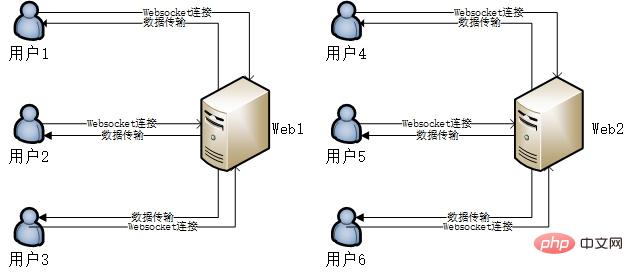Where are swoole used?

Introduction to application scenarios
Connect and communicate with hardware devices (positioning devices)
IM system (used for live broadcast pages Chat communication) (Recommended learning: swoole video tutorial)
Scenario 1 - Real-time collection of positioning data and real-time output (for example, Didi driver’s driving trajectory)
Instructions:
Need to receive all positioning devices in real time and display real-time track records on the map
Notes:
First point:
Users 1, 2, 3 connected to the web1 server, web1 can only broadcast users 1, 2, 3, and cannot broadcast web2 when broadcasting information. Connected users 4, 5, 6, assuming the scene is chatting, user 1 sends a message, only users of the web1 server can see it, and all users of web2 cannot receive it

Second point: Frequency control of messages, for example: 100 devices, 100 users, 100 devices upload one piece of data per second, which needs to be broadcast to each user in real time, that is, 100*100 = 1W times per second, so it can Methods such as summarizing data per second and broadcasting to all users
Scenario 2 - only collecting positioning devices into the database
Instructions: It is necessary to enter the data uploaded by all positioning devices Library, 7 devices, one piece of data per second, I personally use swoole's task function (deliver an asynchronous task to the task_worker pool, this function is non-blocking, the number of worker processes can also be configured) and then call the interface to enter the library
Server memory alarm problem
Reason: It lies in the swoole_server->task function
Officially introduces that the bottom layer of task uses Unix Socket pipe communication, which is full memory and has no IO consumption. The read and write performance of a single process can reach 1 million/s. Different processes use different pipelines to communicate, which can maximize the use of multiple cores.
But if the task is to call the program interface, due to network delay, when the added tasks are larger than the consumed tasks, the memory usage will continue to increase, causing the server's memory to be full.
Solution: Control the frequency of messages entering the task. You can define this time and whether it can be delayed according to your own business scenario, summarize all the data within 1 second and then call the program interface (I personally use redis when summarizing ), it is best to store it directly in the database without calling the interface
Scenario-IM system
Refer to the official github: webim system.
Official wiki: swoole framework wiki
Benefits
Encapsulates the model class of the database, the ORM interface of the database
redis encapsulation, can achieve multi-instance access
The framework has some commonly used methods, such as log, etc. (I only used log)
webim has an official demon, you can refer to
The above is the detailed content of Where are swoole used?. For more information, please follow other related articles on the PHP Chinese website!

Hot AI Tools

Undresser.AI Undress
AI-powered app for creating realistic nude photos

AI Clothes Remover
Online AI tool for removing clothes from photos.

Undress AI Tool
Undress images for free

Clothoff.io
AI clothes remover

Video Face Swap
Swap faces in any video effortlessly with our completely free AI face swap tool!

Hot Article

Hot Tools

Notepad++7.3.1
Easy-to-use and free code editor

SublimeText3 Chinese version
Chinese version, very easy to use

Zend Studio 13.0.1
Powerful PHP integrated development environment

Dreamweaver CS6
Visual web development tools

SublimeText3 Mac version
God-level code editing software (SublimeText3)

Hot Topics
 How to use swoole coroutine in laravel
Apr 09, 2024 pm 06:48 PM
How to use swoole coroutine in laravel
Apr 09, 2024 pm 06:48 PM
Using Swoole coroutines in Laravel can process a large number of requests concurrently. The advantages include: Concurrent processing: allows multiple requests to be processed at the same time. High performance: Based on the Linux epoll event mechanism, it processes requests efficiently. Low resource consumption: requires fewer server resources. Easy to integrate: Seamless integration with Laravel framework, simple to use.
 How to use Swoole to implement a high-performance HTTP reverse proxy server
Nov 07, 2023 am 08:18 AM
How to use Swoole to implement a high-performance HTTP reverse proxy server
Nov 07, 2023 am 08:18 AM
How to use Swoole to implement a high-performance HTTP reverse proxy server Swoole is a high-performance, asynchronous, and concurrent network communication framework based on the PHP language. It provides a series of network functions and can be used to implement HTTP servers, WebSocket servers, etc. In this article, we will introduce how to use Swoole to implement a high-performance HTTP reverse proxy server and provide specific code examples. Environment configuration First, we need to install the Swoole extension on the server
 Which one is better, swoole or workerman?
Apr 09, 2024 pm 07:00 PM
Which one is better, swoole or workerman?
Apr 09, 2024 pm 07:00 PM
Swoole and Workerman are both high-performance PHP server frameworks. Known for its asynchronous processing, excellent performance, and scalability, Swoole is suitable for projects that need to handle a large number of concurrent requests and high throughput. Workerman offers the flexibility of both asynchronous and synchronous modes, with an intuitive API that is better suited for ease of use and projects that handle lower concurrency volumes.
 How does swoole_process allow users to switch?
Apr 09, 2024 pm 06:21 PM
How does swoole_process allow users to switch?
Apr 09, 2024 pm 06:21 PM
Swoole Process allows users to switch. The specific steps are: create a process; set the process user; start the process.
 How to restart the service in swoole framework
Apr 09, 2024 pm 06:15 PM
How to restart the service in swoole framework
Apr 09, 2024 pm 06:15 PM
To restart the Swoole service, follow these steps: Check the service status and get the PID. Use "kill -15 PID" to stop the service. Restart the service using the same command that was used to start the service.
 Which one has better performance, swoole or java?
Apr 09, 2024 pm 07:03 PM
Which one has better performance, swoole or java?
Apr 09, 2024 pm 07:03 PM
Performance comparison: Throughput: Swoole has higher throughput thanks to its coroutine mechanism. Latency: Swoole's coroutine context switching has lower overhead and smaller latency. Memory consumption: Swoole's coroutines occupy less memory. Ease of use: Swoole provides an easier-to-use concurrent programming API.
 Swoole in action: How to use coroutines for concurrent task processing
Nov 07, 2023 pm 02:55 PM
Swoole in action: How to use coroutines for concurrent task processing
Nov 07, 2023 pm 02:55 PM
Swoole in action: How to use coroutines for concurrent task processing Introduction In daily development, we often encounter situations where we need to handle multiple tasks at the same time. The traditional processing method is to use multi-threads or multi-processes to achieve concurrent processing, but this method has certain problems in performance and resource consumption. As a scripting language, PHP usually cannot directly use multi-threading or multi-process methods to handle tasks. However, with the help of the Swoole coroutine library, we can use coroutines to achieve high-performance concurrent task processing. This article will introduce
 How is the swoole coroutine scheduled?
Apr 09, 2024 pm 07:06 PM
How is the swoole coroutine scheduled?
Apr 09, 2024 pm 07:06 PM
Swoole coroutine is a lightweight concurrency library that allows developers to write concurrent programs. The Swoole coroutine scheduling mechanism is based on the coroutine mode and event loop, using the coroutine stack to manage coroutine execution, and suspend them after the coroutine gives up control. The event loop handles IO and timer events. When the coroutine gives up control, it is suspended and returns to the event loop. When an event occurs, Swoole switches from the event loop to the pending coroutine, completing the switch by saving and loading the coroutine state. Coroutine scheduling uses a priority mechanism and supports suspend, sleep, and resume operations to flexibly control coroutine execution.






